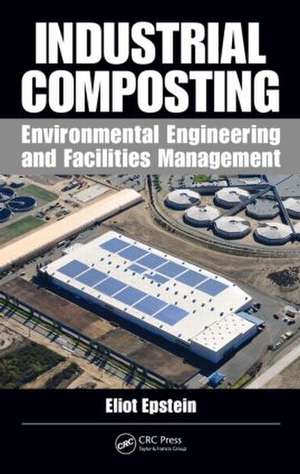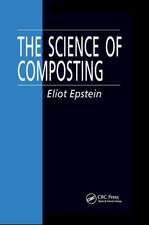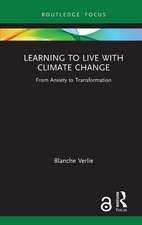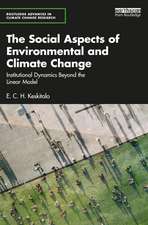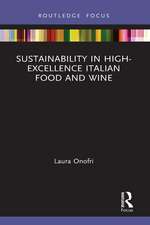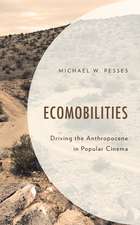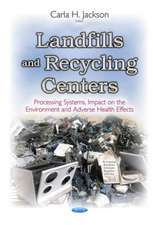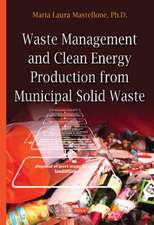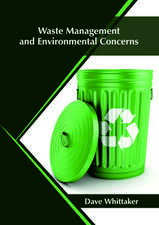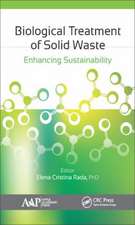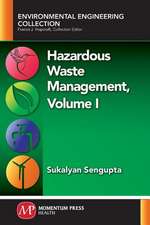Industrial Composting: Environmental Engineering and Facilities Management
Autor Eliot Epsteinen Limba Engleză Hardback – 8 feb 2011
Designed for composting professionals and supported by extensive quality references, this book covers:
- Facilities Planning and Design
- Odor Management
- Design, Material, Energy, and Water Balances
- Economics of Product Marketing and Sales
- Public Relations, Participation, and Communication Regulations
- Pathogen Concentrations as Related to Feedstocks
- Bioaerosols Associated with Composting and Their Potential Diseases
Preț: 1113.95 lei
Preț vechi: 1358.47 lei
-18% Nou
Puncte Express: 1671
Preț estimativ în valută:
213.18€ • 221.74$ • 175.99£
213.18€ • 221.74$ • 175.99£
Carte tipărită la comandă
Livrare economică 15-29 aprilie
Preluare comenzi: 021 569.72.76
Specificații
ISBN-13: 9781439845318
ISBN-10: 143984531X
Pagini: 340
Ilustrații: 124 b/w images and 75 tables
Dimensiuni: 156 x 234 x 23 mm
Greutate: 0.59 kg
Ediția:New.
Editura: CRC Press
Colecția CRC Press
ISBN-10: 143984531X
Pagini: 340
Ilustrații: 124 b/w images and 75 tables
Dimensiuni: 156 x 234 x 23 mm
Greutate: 0.59 kg
Ediția:New.
Editura: CRC Press
Colecția CRC Press
Public țintă
Academic and Professional Practice & DevelopmentCuprins
Perspective. Basic Concepts of Compo Sting. The Composting Process. Approaches to Design and Material, Energy, and Water Balances. Facilites Planning. Composting Technologies and Systems. Facility Design. Econonitcs. Basic Concepts of Odor Management. Operational Control of Odors. Odor Control Systems. Pathogens. Bioaerosols. Site Management. Public Relation, Communication and Regulations. Product Utilization and Marketing.
Recenzii
"Any reference by Dr. Epstein is a valuable tool for the composting professional … It also includes perhaps the most comprehensive list of reference materials, which should be very helpful if the reader desires more information on a particular topic."
—John T. Bouey, P.E., President, Managed Organic Recycling, Inc., Oakland, California
—John T. Bouey, P.E., President, Managed Organic Recycling, Inc., Oakland, California
Notă biografică
Dr. Eliot Epstein is an internationally known expert in composting of waste material. He specializes in composting and biosolids management, solid waste, land application, and waste disposal. He is a soil physicist-agronomist by training.
Dr. Epstein spent 16 years as Research and Station Leader for the U.S. Department of Agriculture Research Service at the University of Maine in Orono, Maine. In 1972, Dr. Epstein transferred to the USDA Research Center at Beltsville, Maryland, where he was the principal scientist on the project that resulted in the development of the "Beltsville" Forced Aeration Composting System for sewage sludge. Dr. Epstein has directed a variety of waste management projects for both government and industry.
Dr. Epstein spent 16 years as Research and Station Leader for the U.S. Department of Agriculture Research Service at the University of Maine in Orono, Maine. In 1972, Dr. Epstein transferred to the USDA Research Center at Beltsville, Maryland, where he was the principal scientist on the project that resulted in the development of the "Beltsville" Forced Aeration Composting System for sewage sludge. Dr. Epstein has directed a variety of waste management projects for both government and industry.
Descriere
Packed with figures, photographs, and tables, this book covers the technical and environmental engineering aspects of large-scale industrial composting. It covers facilities design, planning, operational issues, environmental impacts, public relations, and community concerns, as well as the utilization and economics of marketing compost. It also provides operators and managers a full understanding of the management of odors, such as neutralizers and additives, bioaerosols, and other facilities issues. Chapters on facility siting, planning, permitting, site management, and community involvement round out the coverage.
